By Sparing Israel, Abbas Deepens Palestinian Split
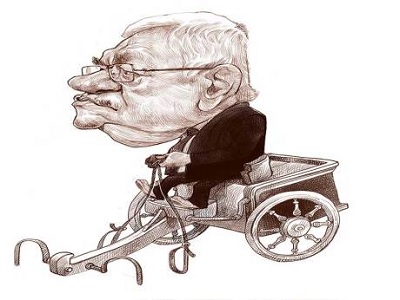
(Image: Ramachandra Babu, Gulf News)
By Ramzy Baroud
Palestinian National Authority President, Mahmoud Abbas, is playing a very dangerous political game. At the same time as he is placing less pressure on the belligerent Israeli government of Benjamin Netanyahu, he is keeping Palestinians further apart.
Even when the 81-year-old leader no longer maintains his position, the legacy he has stubbornly espoused for over a decade will further fragment Palestinians for years to come.
While Israel has rapidly increased its rate of land grab in the West Bank, occupied East Jerusalem and the Jordan Valley, and declared yet more plans to erect illegal Jewish colonies, Abbas has decidedly backed down from pursuing the matter at the United Nations.
In a sudden, but not unfamiliar move, Abbas elected to postpone pushing through with a UN Security Council Resolution that aims at condemning Israel’s land seizure and continued illegal construction on Palestinian lands.
The resolution would once more have put Israel’s illegal practices, which violate international law, back on the agenda of the international community, at a time that Palestine has been either overlooked or sidelined.
This move even infuriated some in Abbas’ own party, who find his decisions these days quite indefensible.
The PNA hastily tried to explain the decision and defend Abbas’ stance, which will spare Israel the burden of international censure, alleging that the postponement of the resolution is necessary to give France the needed space to conduct an international peace conference.
However, the definite irony in all of this is that France’s proposed conference, slated for later in the summer, has no clear agenda, and is predicated on the frivolous and unrealistic assumption that a so-called two-state solution is still achievable.
In fact, it was the illegal Jewish colonies that made such a ‘solution’ untenable in the first place. By postponing the resolution for the sake of another deluding and elusive peace mirage, Abbas has shown his incapacity to lead his people at a time of immense challenge and much bloodletting, and moreover, at a forum which was ideal for the needs and voices of the Palestinian people to be understood and heard.
Relevant to all of this, Israeli Prime Minister Benjamin Netanyahu has flagrantly rejected the French peace conference anyway.
In a short statement, his office repeated the same mantra that: “Israel adheres to its position that the best way to resolve the conflict between Israel and the Palestinians is direct, bilateral negotiations”.
Of course, Israel, an occupying power, has shown no interest in a justly negotiated solution as it continues to harvest Palestinian lives daily, confiscates more land and subjugates Palestinians who are ruled by the military orders of the Israeli army. No fair ‘direct negotiations’ can reasonably take place in these circumstances. Predictably, Netanyahu is fully aware that his ‘offer’ is a mere distraction in order for him to win the needed time to finalise the colonisation of whatever little remains of Palestine. However, Abbas is equally aware of that. The subliminal message his actions voice is clear — the ageing leader seems to be, in fact, trying to facilitate the Israeli effort, not thwart it.
The suggestion that Abbas’ advanced age could possibly explain some of his bizarre recent statements is not satisfactory. For example, without much fanfare, Abbas had recently established a ‘constitutional court’ composed of some of his closest supporters. The nine-member court “will have supremacy over all lower courts,” reported Newsweek.
“It’s a blatant power grab,” Grant Rumley, a research fellow at the Foundation for Defence of Democracies told Reuters. “From Abbas’s standpoint, this is his way of both thwarting his rivals in Hamas and securing his Fatah party’s hold on the Palestinian [National] Authority once he is gone.”
Abbas currently rules over Palestinians by decree, not democratic elections since his four-year term expired in 2009.
Moreover, according to the Palestinian Basic Law, drafted 14 years ago, in the president’s absence, the government is to be run by the speaker of the Legislative Council, who is a member of Hamas.
Abbas is cunning enough to establish a constitutional court to ensure the dominance of his followers once he is gone, yet seemingly lacks the wisdom or even the desire to understand the priority of uniting his people during a time of hardship, and rapid loss of land and life.
Not only did Abbas fail miserably in his mission as the leader of the Palestinians, he seems to stand for nothing aside from serving the interests of a rich, albeit small class of West Bankers, while repeating the time-worn cliches of peace and peace process.
“We won’t act like them, we will not use violence or force, we are peaceful, we believe in peace, in peaceful popular resistance,” was his message issued in October, only days after incidents took place in which Palestinian youth were accused of attacking Israeli soldiers and colonists with knives.
Just two weeks before Abbas made that statement in which he referred to some illusory ‘popular resistance’ under his command, a poll conducted by the Palestinian Centre for Policy and Survey Research in Ramallah revealed that a majority of Palestinians, in fact 65 per cent of respondents, want him to resign.
Abbas’ ‘peace’ is, of course, quite selective. He rules over occupied Palestinians with an iron fist, rarely tolerates dissent within his party’s (Fatah) ranks, and has done his utmost to isolate Gaza and sustain a state of conflict with his enemies in Hamas.
More recently, and due to mere criticism levelled at him by the Popular Front for the Liberation of Palestine, a prominent Palestinian faction and PLO member, Abbas decided to choke them of funds. In Abbas’ ‘peaceful’ world, there is zero room for tolerance.
The PFLP criticism was in response to statements he made on Israeli television.
In the interview, he insisted that security co-ordination with Israel is a top priority for him. Without such co-ordination, the PNA will find itself “on the brink of collapse,” he told Israel Channel 2 on March 31.
Apart from apprehending suspected Palestinian resistance members, the security co-ordination includes searching school children’s bags for knives, according to the Palestinian leader. “Our security forces are entering schools and checking if students are carrying knives. In one school, we found 70 students with knives, and we told them that this was wrong. I told them I do not want you to kill someone and die; I want you to live and for others to live, too.”
Abbas’ statement on life and death does not, in the least, address the context of oppression, the humiliation of military occupation and the prevailing sense of despair that exists among young Palestinians, caught between an aggressive, violent occupation, and a submissive leadership. In fact, he failed to address the anger that exists within even the Palestinian youth due to the occupation.
Convincing them not to ‘kill someone and die, “involved the security forces arresting the students who were found with knives, questioning them, torturing them and threatening their families,” wrote Palestinian commentator, Munir Shafiq.
“We only need to listen to the experiences of many who were tortured by the Israeli Shabak and the Palestinian security agencies, who said that the Palestinian security agencies are harsher, more barbaric and more brutal than the Shabak,” Shafiq wrote in Arabi21.
However, it is essential that the discussion does not entirely focus on Abbas, for he is merely representative of a larger, more sinister class of usurpers who have used the Palestinian cause to advance their own positions, wealth and prestige.
True, it has been a decade of unmitigated failure of Palestinian leadership, but it certainly took more than Abbas to manage that political fiasco. Now, at 81, Abbas seems to have become a scapegoat and mouthpiece for an entire class of Palestinians which has worked to manage the occupation and benefit from it.
– Dr. Ramzy Baroud has been writing about the Middle East for over 20 years. He is an internationally-syndicated columnist, a media consultant, an author of several books and the founder of PalestineChronicle.com. His books include “Searching Jenin”, “The Second Palestinian Intifada” and his latest “My Father Was a Freedom Fighter: Gaza’s Untold Story”. His website is www.ramzybaroud.net.














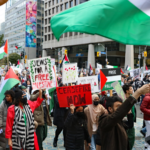
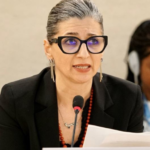

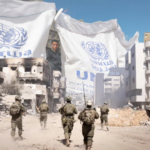

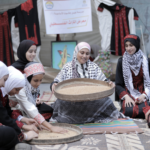


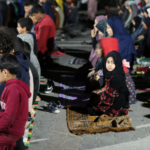
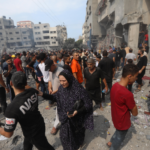








0 Comments